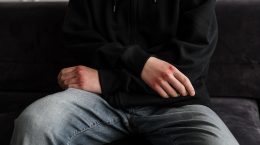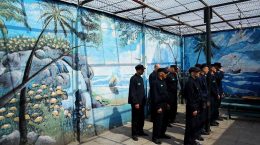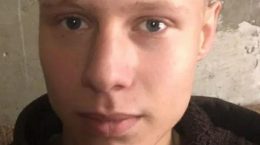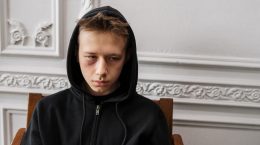We have already written about how drug dealers lure children and adolescents into their networks – offer them fabulous sums of money for an otherwise dull job. The easiest way is to buy orphans, who often have no one to protect. It is doubly difficult for them – apart from having no parents, they have no material support. The only hope is earning money at the risk of freedom.
Artem was 23 years old when he was detained. Under part 4 of article 328 (drug trafficking organization), the guy received 12 years. Now he is being held in penal colony No2 in Bobruisk. He did not fall under the amnesty. In addition, the guy did not have the opportunity to pay the legal costs.
Leonid was 17 years old at the time of his arrest, he studied at the Gomel State
professional polytechnic lyceum №144. During the arrest, he was handcuffed and the police beat him. He was also physically injured during the first interrogation, at which he did not have a lawyer. Due to being taken into custody, Leonid was unable to complete his education – the state violated his right to receive an education. In 2020, his term was reduced by 1 year – but the guy will still be in prison for 9 years. It is located in penal colony No 22 “Wolf Burrows”.
Nikita’s mother died in 2005, when he was 7 years old. Father passed away four years after my mother. The guy did not have a single close relative. When he was 18 years old, he was detained. His trial took place in 2017, before which Nikita spent almost three months in pre-trial detention. The guy was sentenced to 11 years in prison under Part 4 of Article 328. In 2020, a supervisory appeal was filed with the Supreme Court. After that, Nikita’s sentence was mitigated – now he is sentenced to 9 years in prison.
Dmitry is an actual orphan. His mother was deprived of parental rights when the boy
was 12 years old. His father left the family when Dima was six, and died in 2013 (the guy was then 15 years old). At the age of 19, Dmitry was detained. He was convicted under part 1 of article 328 (possession of drugs) and part 3 of article 328 (manufacture, processing, acquisition, storage, transportation or transfer or illegal sale of drugs by a group of persons). Dmitry was sentenced to 8 years in prison. An amnesty was applied to him and his three-year sentence was lifted. The guy will be released in 2021.
Two more orphans – 19-year-old Oleg and Vladimir – are in the educational colony No. 2 in Bobruisk. Oleg was sentenced to imprisonment under part 4 of article 328, Vladimir is serving a sentence under part 3 of article 328, his term is 9 years in prison. In 2019, two out of three detachments in the colony were formed from young men sitting under Article 328. The boys are given four minutes to eat, each of them is allowed only one set of clothes. And besides studying, teenagers mine rubber with their hands – for this, young prisoners were paid about 2 to 5 rubles a month in 2019.
The status of being an orphan child is not a mitigating factor in sentencing. It turns out that orphans in prison are people with no rights, even more powerless than ordinary prisoners. They do not receive packages from out of prison, according to the law, only relatives can send them. Noone is coming to visit them. Nobody solves their health problems, there is nobody to fight for them. Also, an orphan in prison ceases to receive an allowance from the state. As if being a prisoner stopped being an orphan. He cannot pay legal fees and duties – he has no money for this, and this money is deducted from his “income” in prison. It is easy to guess that this person will come out of imprisonment without money – the further road either to the Red Cross and the organization of assistance to former convicts, or back to prison.
We have already talked about what orphans convicted under Article 328 face. We would like to clarify why this particular category of young people decide to distribute drugs and then pay for it with years in prison. The illegitimate authorities pay support and provide orphans with social housing – it seems that for the first few months after coming of age one does not need anything, and then there is work for them.
But in fact, an orphan in an orphanage, starting at the age of seven, receives 12.10 rubles from the state every month. Monetary compensation for the purchase of sets of clothing, footwear, soft inventory and equipment, hygiene products after graduation from an orphanage or boarding school is 276.41 rubles per year for boys and 286.15 rubles per year for girls. While studying at a university, college, lyceum or vocational school, an orphan is supposed to have a hostel, for which you do not need to pay. A scholarship is also assigned – in colleges in the first semester it is 75.58 rubles, in universities – 87.21 rubles. Then, by success in studies, you can increase the payment to 120.94 rubles in colleges and 139.54 rubles in universities. If the scholarship is lost due to failed exams, the orphan can count on a social scholarship – 58.14 rubles for those who receive secondary specialized education, 69.77 rubles for those who receive higher education. Only after the profession is obtained and there is a certificate of employment or registration with the employment service, the orphan is entitled to severance pay – monetary compensation is more than 1,000 rubles (this amount is annually adjusted to take into account the rise in prices). If he goes on to study further, he will receive a lift at the end of the next level of education.
As for the apartment, after leaving the orphanage, the orphan can return to the apartment or house where his parents lived (if they died). If the living space has fallen into disrepair, or those living there lead an immoral lifestyle, you can get social housing. At the same time, according to the requirements of the law, it is provided within 6 months after the orphans reach the age of majority or, at their request, within six months after graduation from educational institutions or at the end of their military service. Most often this is a dorm room – after all, houses are not rented out every day.
Natural questions arise: where to live for an orphan until he is provided with social housing? How can you survive on a social welfare grant or even a university scholarship if you have to buy clothes, shoes, hygiene products, stationery and equipment after leaving an orphanage? In addition, the first scholarship is paid only at the end of the first month of study at the university. So, it turns out that, barely leaving the gates of the orphanage, the orphan, among other issues, must start looking for work, and in case of successful employment (which is also a very painful issue) – combine work with study and risk either loss of earnings, or the loss of a student status. In a word, for children without parents on the brink of survival, easy money for distributing “smoking mixtures” seems to be a real salvation – which then costs them their freedom.









